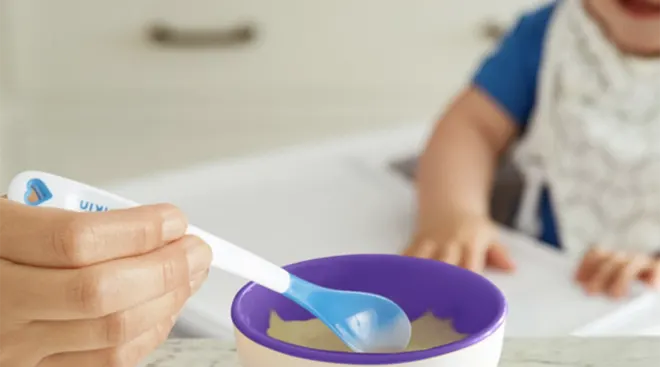Everything to Know About Baby Vomiting—and What to Do About It
Throwing up is no fun for anyone. And while you don’t particularly relish the gag and go, you really hate watching your little one endure the unpleasantness that is puking. (It’s enough to make you worried sick!) If you’re pacing the floor wondering what’s causing a bout of baby vomiting and what you can do about it, rest assured you’re not alone. Fortunately, newborn and infant vomiting is often par for the course—and it’s typically not a cause for concern. Of course, this truth feels like little comfort when you’re in the throes of baby throwing up. So what can you do to help baby get some relief? Read on to learn more about baby vomiting, including how to distinguish between everyday spit-up and something more substantial.
It can be tough to tell the difference between baby spit-up and vomit at first, but there are some key differences between the two. For starters, babies tend to spit-up much less frequently once they’re past the one-year mark and eating solids, says Susan Anduaga Bocanegra, a pediatrician with Banner Health Center plus at Arcadia in Arizona (more on this below). But until then, the clue to differentiating baby vomit vs spit-up may lie in baby’s mood immediately after.
“Spitting up usually looks like the stomach contents are ‘pouring out’ of the mouth. Baby isn’t bothered by it, and instead goes about their business,” says Anthony M. Loizides, MD, medical director of the pharmaceutical company Ipsen. Bocanegra adds that spit-up usually happens following a feeding or burping session: “Tend to act hungry and happy afterwards.” On the other hand, vomiting involves baby’s abdominal muscles and diaphragm forcefully contracting to expel large amounts of liquid or food from the stomach. Unlike with spitting-up, baby vomiting can leave them irritable and fussy.
Another way you might differentiate baby spitting up vs vomiting is by the color and texture of the expelled contents. According to Bocanegra, baby spit-up is often clear, as it mostly consists of partially digested or recently ingested formula or breast milk, as well as saliva. Of course, if your infant is still on a milk-only diet, it can be harder to distinguish between the two. Once they start solid foods, the difference will become more clear. Vomit will often contain regurgitated food and have a thicker consistency.
Babies throw up for a number of reasons. While you may be tempted to blame a stomach bug or other illness, that’s not always the case. Below, some common culprits for infant vomiting and spit-up.
A milk or food allergy
If baby is consistently throwing up milk after feeding and doesn’t have a fever, it could be due to a milk protein allergy. “Baby vomiting can be related to the exposure to milk proteins either via breast milk or formula,” says Melanie Greifer, MD, a pediatric gastroenterologist at Hassenfeld Children’s Hospital at NYU Langone in New York City. If baby is throwing up formula, talk to your pediatrician about switching to a soy-based formula or a hydrolyzed formula, which breaks down the milk particles and makes them easier for baby to digest. Similarly, if baby is throwing up milk after breastfeeding, it can indicate that they’re allergic to something in your diet.
Eating too much or too quickly
Eating too much or too fast is another reason for baby vomiting after a feeding, Greifer says. They may be overfeeding and taking in more milk than can comfortably fit in their small stomach. Or, they may need to be burped more often during and after feedings.
Gastroesophageal Reflux
According to Mayo Clinic, approximately 50 percent of babies experience GER or infant acid reflux, when the contents of baby’s stomach moves back up through their esophagus. The lower esophageal sphincter—the muscle between the esophagus and stomach—takes time to mature and develop—and, until it does, they may spit-up, especially when their tummies are full. You may be able to spot GER if baby’s spit-up or vomit appears yellow; this can indicate that stomach acid that has mixed with formula or breast milk, Bocanegra says.
“Reflux isn’t usually harmful for babies, and they [often] grow out of it with time,” she adds. However, more frequent and serious cases of acid reflux in infants may be accompanied by discomfort, insufficient diet and weight gain and diarrhea. This is known as gastroesophageal reflux disease (GERD). In these circumstances, reach out to your pediatrician for a professional evaluation.
Baby’s laying down
It’s not just your imagination—baby vomiting at night after feeding can be a common occurrence. “When baby lies down [flat] on their back (the sleep position recommended by the American Academy of Pediatrics), anatomically the position of the stomach is higher than the esophagus,” Loizides explains. “Therefore it’s more likely that a baby may spit-up.” Plus, the valve between the stomach and esophagus relaxes more while baby’s sleeping, leading to a baby throwing up more often at night than during the day.
If baby suffers from reflux and is having more spit-up or vomiting episodes at night, you may be tempted to put them to sleep on an incline, but that’s not a safe position for little ones.
An illness or infection
Of course, it is possible baby vomiting is due to a viral gastrointestinal infection, such as rotaviruses, noroviruses, enteroviruses or adenoviruses, per the AAP. Rotaviruses are the most common culprit of baby vomiting and are usually accompanied by other symptoms like diarrhea, fever and nausea. While rotaviruses are highly contagious, they’re becoming less common in young children, thanks to vaccines.
Rarely, more serious illnesses, like meningitis, urinary tract infections, appendicitis, bacterial or parasitic infections can cause baby vomiting. These require immediate medical attention.
Pyloric stenosis
Baby throwing up a bit of clear liquid is usually no big deal, but if they perpetually vomit 15 to 30 minutes after every feeding, it could be pyloric stenosis. Pyloric stenosis is a rare condition in which the valve between the stomach and small intestines thickens, becomes too tight and prevents food from passing through, Bocanegra says. The onset of this condition is typically between 2 weeks and 4 months of age, the AAP notes. It often begins as a typical episode of baby throwing up milk and clear liquid after a feeding—but quickly escalates in both force (often leading to projectile vomiting) and number of episodes. Pyloric stenosis is serious and requires medical attention, but, fortunately, can be resolved with a simple surgical procedure that opens the narrowed area.
Other causes of baby vomiting
The AAP notes other causes for baby vomiting can include certain medications and motion sickness.
Unfortunately, spit-up and vomit are normal parts of babyhood. The good news is that most infants recover from an episode quickly, Bocanegra says. While you may not be able to completely stop baby from vomiting, there are ways to mitigate the issue and ensure your little one stays happy and healthy.
Reconsider baby’s feeding structure
If baby is frequently spitting up, consider changing up the way they eat. Try not to feed them as much, burp them more frequently and try a different bottle, nipple or formula (with your pediatrician approval), Bocanegra suggests. You may also want to feed baby smaller, more frequent meals to help them keep food down. “If nursing, offer one breast per feeding,” advises Bocanegra. If you’re breastfeeding, consider modifying your diet to see if that helps. Additionally, “to treat acid reflux, pediatricians may recommend thickening formula or expressed milk with small amounts of baby cereal, or starting a medication,” she says. “If acid reflux is severe, a referral to a gastroenterologist may be necessary.”
Hold baby in an upright position
Bocanegra recommends holding baby upright during a feeding and for about 30 minutes afterwards. Help them burp several times during and after a meal by sitting them upright, supporting their head with your hand, letting them lean forward slightly and gently patting their back. Try not to move, bounce or play with them too much for approximately 30 minutes after a feeding too (that includes putting them in bouncers and swings).
Watch for signs of dehydration
If baby is experiencing perpetual vomiting, you’ll want to watch out for dehydration. According to the AAP, one of the most common causes of dehydration is baby throwing up. Some signs of dehydration in babies include:
- Reduced amount of wet diapers
- Dark urine
- Reduced or no tears when crying
- Dry mouth, lips and tongue
To test if baby is dehydrated, Bocanegra recommends pressing on their thumbnail to make it pale, then count how many seconds it takes for their nail to turn pink again. If it’s longer than a couple of seconds, baby is likely dehydrated. You’ll want to reach out to your pediatrician for next steps.
While water isn’t safe for babies under 6 months, Bocanegra says parents can keep infants hydrated by slowly offering small amounts of formula or breast milk. She also suggests avoiding solids to reduce baby’s risk of choking (plus, they may be harder on baby’s stomach if baby’s throwing up).
Rest assured that, most of the time, when baby’s vomiting with no fever, it’s pretty harmless and likely to pass soon. “Normal spitting up doesn’t interfere with a baby’s growth and development,” Bocanegra says. “If the infant seems comfortable, eating well, tolerating feeds and gaining appropriate weight, [it’s] ok and will improve with time—usually by one year old.”
There are, however, some situations where baby throwing up is a sign of something more serious. “If the symptoms aren’t improving, and spit-ups are happening more frequently, then further evaluation should be conducted by a pediatrician to see if there’s an underlying condition,” Bocanegra says. Below, some red flags that warrant medical intervention:
- Blood or bile in baby’s vomit
- Severe abdominal pain
- Swollen or enlarged abdomen
- Severe irritability
- Lethargy
- Convulsions
- Strenuous vomiting
- Vomiting that lasts over 24 hours
- Signs of dehydration
- Vomiting accompanied by a high fever (could indicate a bacterial infection or appendicitis)
- Baby’s not gaining weight
- Baby cries inconsolably during or after a feeding
- Forcefully or projectile vomiting after every feeding (could indicate pyloric stenosis)
No parent enjoys seeing their baby throwing up, but most of the time, it’s no really no big deal. “If baby is healthy, growing well and happy, you don’t need to worry,” Bocanegra says. Your little one will be feeling content and carefree in no time.
Please note: The Bump and the materials and information it contains are not intended to, and do not constitute, medical or other health advice or diagnosis and should not be used as such. You should always consult with a qualified physician or health professional about your specific circumstances.
Plus, more from The Bump:
Susan Anduaga Bocanegra, is a pediatrician with Banner Health Center plus at Arcadia in Arizona. She earned her medical degree from the University of Colorado School of Medicine and completed her pediatric and internal medicine residency at Banner University Medical Center.
Melanie Greifer, MD, is a pediatric gastroenterologist at Hassenfeld Children’s Hospital at NYU Langone in New York City. She also serves as a clinical associate professor in the department of pediatrics at NYU Grossman School of Medicine. She earned her medical degree from the State University of New York and completed her residency in pediatrics at NewYork-Presbyterian/Weill Cornell Medical Center.
Anthony M. Loizides, MD, is a medical director with pharma company Ipsen. He has over 18 years of experience in the medical field and received his medical degree from Stony Brook University. He completed his pediatric residency at Harvard Medical School.
Mayo Clinic, Spitting up in babies: What's normal, what's not, 2023
American Academy of Pediatrics, Infant Vomiting, November 2015
Centers for Disease Control and Prevention, Rotavirus VIS, October 2021
American Academy of Pediatrics, Vomiting (0-12 Months), 2023
Learn how we ensure the accuracy of our content through our editorial and medical review process.
Navigate forward to interact with the calendar and select a date. Press the question mark key to get the keyboard shortcuts for changing dates.




















































